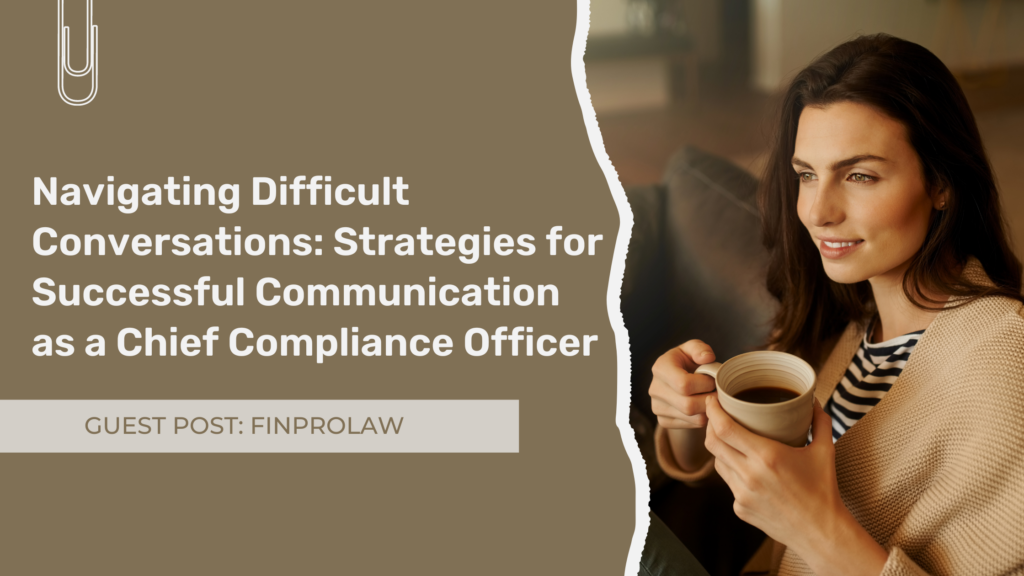In this post, United Atlantic Legal Services shares Navigating Difficult Conversations: Strategies for Successful Communication as a Chief Compliance Officer – a guest post by our affiliated educational services platform for investment adviser Chief Compliance Officers: FinProLaw.

Navigating Difficult Conversations: Strategies for Successful Communication as a Chief Compliance Officer
Difficult conversations are an inevitable part of being an investment adviser Chief Compliance Officer. Whether it involves delivering tough feedback, addressing conflicts, or discussing sensitive topics, these conversations can be challenging and uncomfortable. However, avoiding them can lead to misunderstandings, decreased productivity, and damaged relationships. The ability to have successful difficult conversations is a crucial skill for effective leadership and fostering a healthy work environment. In this blog, FinProLaw will explore strategies that can help navigate and lead to successful outcomes in difficult conversations in a business setting.
Prepare Yourself
Before initiating a difficult conversation, it is essential to prepare yourself mentally and emotionally. Clarify your objectives and desired outcomes for the conversation. Consider the other person’s perspective and anticipate their reactions. Being a Chief Compliance Officer can be stressful so take time to reflect on your own emotions and biases, ensuring that you approach the conversation with empathy and objectivity. By preparing yourself, you can enter the discussion with a clear mindset and a focus on finding a resolution.
Choose the Right Time and Place
Selecting an appropriate time and place for the conversation is crucial. Find a setting that is private, quiet, and free from distractions. We have all worked with the co-worker who insists on giving less-than-flattering feedback loudly, forcefully and in front of other. Timing is equally important to privacy, so choose a moment when both parties are calm and receptive. Avoid having difficult conversations in public or when either party is rushed or preoccupied. Creating a conducive environment can contribute to a more productive and focused dialogue.
Establish a Positive Tone
The tone of the conversation sets the stage for its outcome. Start by establishing a positive and respectful tone to create a safe space for open communication. Use non-confrontational language and focus on the issue at hand rather than attacking the person. Be mindful of your body language, maintaining eye contact and using open gestures to convey a sense of openness and willingness to listen. Establishing a positive tone helps to build trust and encourages the other person to engage in the conversation constructively. Maintaining a positive tone is particularly import given the context in which many others see a Chief Compliance Officer: as an authoritative figure. As such, many people are often already uncomfortable given the participants of the conversation.
Active Listening
Active listening is a fundamental skill in difficult conversations. It involves fully concentrating on the speaker, understanding their perspective, and demonstrating empathy. Avoid interrupting or formulating your response while the other person is speaking. Instead, focus on understanding their emotions, concerns, and underlying motivations. Paraphrase and summarize their points to ensure that you have correctly understood them. By actively listening, you show respect and validate the other person’s experience, fostering a more productive conversation. Again, this particularly important for Chief Compliance Officers who typically have significant depth and breadth of experience: you can always learn more.
Use “I” Statements and Avoid Blame
When expressing your concerns or feedback, use “I” statements to convey your perspective without assigning blame. For example, say, “I feel concerned about the missed deadlines” instead of “You always miss deadlines.” By using “I” statements, you take ownership of your feelings and opinions, making it easier for the other person to understand your perspective without feeling attacked. Focus on the behavior or situation rather than making personal attacks, enabling a more constructive conversation. This also helps to demonstrate that the other person is not on an island and that you are in this struggle together. As a Chief Compliance Officer, you are a leader, show it by working collaboratively and clearing a path for others to do better.
Seek Solutions and Find Common Ground
Instead of dwelling on the problem, shift the conversation toward finding solutions. Collaborate with the other person to explore alternative approaches or actions that can address the issue. Look for areas of common ground and shared objectives to build a sense of unity and collaboration. By focusing on problem-solving, you can transform a difficult conversation into an opportunity for growth and improvement. As the Chief Compliance Officer, you may have already encountered the problem and have an idea of what the best way to approach solving it might be. While giving soft suggestions might help steer the conversation, allowing more junior members of the team to find their own way is also important.
Follow-up and Follow-through
After the difficult conversation, ensure that you follow up on any commitments or action steps that were discussed. This demonstrates your commitment to finding a resolution and maintaining accountability. Check in with the other person to ensure that they feel heard and understood. If necessary, schedule further conversations to track progress or address any lingering concerns. Effective follow-up and follow-through reinforce the positive impact of the difficult conversation and help to maintain a healthy working relationship.
What a CCO Ought to Know
Difficult conversations are an integral part of effective communication as an investment adviser Chief Compliance Officer. By preparing yourself, establishing a positive tone, and actively listening, you can create an environment conducive to productive dialogue. Using “I” statements and focusing on solutions rather than blame helps to keep the conversation constructive. By seeking common ground and following up on commitments, difficult conversations can become catalysts for growth, understanding, and strengthened relationships. With practice and a commitment to open and honest communication, businesses can navigate difficult conversations successfully, leading to a more harmonious and productive work environment.
Remember, the goal of these conversations is typically to create an environment where everyone wants to do better: not to make the situation worse.

About the Author
Michael Rasmussen is the founder of United Atlantic Legal Services. He is a licensed attorney in Florida and registered solicitor in the United Kingdom. Michael has acted as General Counsel and Chief Compliance Officer to several investment advisers, including private fund managers, responsible for the management of billions of dollars in client assets.
Michael is also the founder of FinProLaw, an online learning platform where Michael has created courses designed for investment adviser compliance professionals. These courses include:
Michael can also be found on LinkedIn.
Investment adviser firms who are also clients of United Atlantic Legal Services can receive many of these courses at a significantly reduced fee or, in some cases, at no expense. Contact us today or visit the FinProLaw to learn more.